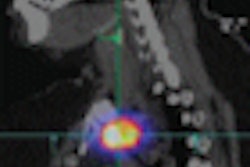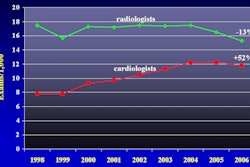The U.S. Centers for Medicare and Medicaid Services (CMS) has taken another step toward the possible expansion of Medicare coverage for initial diagnostic testing with PET for cancer patients.
On January 6, CMS proposed new coverage that would replace the four-part framework -- covering diagnosis, staging, restaging, and monitoring response to treatment -- with a two-part framework that differentiates the use of FDG-PET imaging in the initial treatment plan from other uses related to guiding subsequent treatment strategies.
Under the proposal, CMS would reimburse for one FDG-PET study for patients with solid tumors that are biopsy-proven or "strongly suspected" based on other diagnostic testing, when the patient's treating physician determines that the FDG-PET study is necessary to determine the location and/or extent of the tumor.
FDG-PET exams would also be eligible for reimbursement if a study is needed to determine a patient's viability for an invasive diagnostic or therapeutic procedure.
In its decision, CMS noted an exception for patients with adenocarcinoma of the prostate. The agency ruled that the evidence did not demonstrate that FDG-PET "improves physician decision-making in the determination of initial antitumor treatment strategy in Medicare beneficiaries who have adenocarcinoma of the prostate" and "does not improve health outcomes."
CMS also evaluated evidence on the use of FDG-PET in treatment strategies for patients with tumor types other than breast, cervical, colorectal, esophageal, head and neck (non-CNS/thyroid), lymphoma, melanoma, non-small cell lung, and thyroid.
For all other tumor types, CMS proposed that the evidence is not adequate to determine that the imaging modality improves physician decision-making for subsequent antitumor treatment strategy, and thus does not improve health outcomes for Medicare beneficiaries.
However, the agency did propose that the available evidence supports that FDG-PET for subsequent antitumor treatment strategy is reasonable and necessary for certain tumor types. Therefore, CMS would cover a subsequent FDG-PET study, under certain conditions, for those tumor types with the recommendation of the treating physician.
CMS is taking public comments on its proposed decision through February 5 and will issue a final national coverage determination in April.
The catalyst for the agency's consideration of expanded FDG-PET coverage is patient information and outcome results from the National Oncologic PET Registry (NOPR). The NOPR collected data from more than 1,200 PET facilities across the U.S. to see how FDG-PET scans influence cancer treatment plans.
In its analysis of 22,975 patients, the study found that FDG-PET prompted changes in patient management in 36.5% of the cases. Within that 36.5%, FDG-PET results prompted a change from nontreatment to a treatment plan 28% of the time, while 8% of cases changed from treatment to nontreatment decisions.
Related Reading
CMS reconsiders PET coverage framework, September 16, 2008
CMS sets date for PET coverage meeting, August 5, 2008
NOPR asks CMS to expand FDG-PET coverage, April 11, 2008
NOPR study: PET influences cancer care, March 25, 2008
NOPR releases preliminary results of PET treatment strategies, January 11, 2008
Copyright © 2009 AuntMinnie.com



















